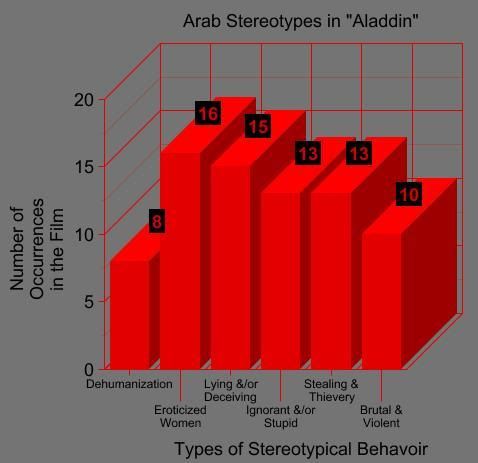 |
| "Aladdin" content analysis for stereotypes, compiled by Rebecca McKinnon |
Dehumanization refers to any act that belittles someone in such a way as to suggest s/he is less than human, and therefore, doesn't deserve to be treated with respect
Eroticized Women refers to any overly sexualized woman that is without redeeming social value; her looks are all that seems to be going for her.
Lying &/or Deceiving refers to any character that lies either directly or by omission and/or pretends to be something s/he isn't, normally in an effort to achieve a selfish desire
Ignorant &/or Stupid refers to any character that does not know the entirety of his/her world, often freeing him/herself from the lies around, believing unrealities and/or blatantly lacking knowledge that others possess
Stealing & Thievery refers to any act of physical thievery, ie: someone taking something that did not originally belong to him/her without exchanging any funds for the receival of said item
Brutal & Violent refers to any personification and/or action that implies the intent to brutally injure someone without a fair trial
Such harsh categories for what is thought of as a funny, romantic, musical Disney film, right? Here is the trailer, which advertises this positive spirit.
Though it's advertised as pleasant, I found many Arab stereotypes in "Aladdin," all of which are categorized and included in the following video:
The very first character shown (the merchant) can be placed under the deceiving category, as his only desire is to make a sale. He makes the dual-action hookah sound fantastic, deceiving the audience to believe he's telling the truth ("It will not break.") right before it breaks in his hands--revealing his lie.
The second character (the man in rags at Jafar's feet in the desert) can be placed under the thievery category, as he "had to slit a few throats" to get the golden beetle--the key to the Cave of Wonders.
The third and main character, Aladdin, can be placed under the thievery category for the stolen bread in his hand.
The group of law officials chasing Aladdin can be placed under the brutal & violent category and later on in the scene under the ignorant & stupid category. They chase Aladdin with the intent to kill him, often swinging their swords without regard for innocent bystanders. They act stupidly, forgetting they own swords when the monkey brandishes one. Later on, a merchant (a character with more power than the lower class) also becomes a brute in response to Jasmine's accidental thievery.
Aladdin jumps into a room of belly dancers, which are prominently featured as eroticized women in the film. The women have a combination of pretty looks and sexy body movements, fawning all over Aladdin before letting him leave.
During the chase, the clip points out "Indian" fire walkers, sword swallowers, floating meditators, needle-bed sleepers and cobra tamers--convincing the audience that the streets of Arabic society are full of freaks. Therefore, Arabic people must come from a long line of freaks.
Many examples then show Jasmine being dehumanized, deceived and controlled by the men in her life, even the man she loves ("Do you think I'm stupid?!"). Eventually Jafar reduces her to a slave as she's forced to feed him.
Each of these examples show that Arabs are selfish, greedy, and untrustworthy. All three of these characteristics might lead to a security guard "randomly" choosing an innocent Arab for search at the airport. Furthermore, a few of the depictions suggest that Arabs are willing to become violent to get what they desire--linking characters like Jafar to the violent terrorists of today. The main character of the story, Aladdin, doesn't escape uncategorized--convincing children in song that it's okay to steal if you're hungry ("Gotta eat to live, gotta steal to eat"). Even the law enforcement officers are stupid brutes, suggesting that Arabic power is without reason and lies in evil and violence, with little good to counteract it. Very few women in Arabic society can be both pretty and in a stable profession--as almost every pretty woman is an eroticized belly dancer. Jasmine the princess is the only exception, but she suffers for her individuality and her unwillingness to submit.
How can such stereotypes exist in one of the most popular children's productions ever animated? "Aladdin" won 22 awards (including two Oscars) and received 15 other nominations. (Source) After almost two decades of popularity, it still holds a 7.8-star IMDb rating.
Will young girls such as my niece strive to be princesses because every other woman depicted in "Aladdin" is either powerless or eroticized? Will she expect her opportunities in life to be lesser than her older brother's, and thus connect marriage with success rather than striving for her own goals? Socialization theory argues that the media teaches children about their adult roles. Will her's be of submission, powerlessness, and second-bests?
Or worse--will they judge an Arabic classmate based on the Arab stereotypes portrayed in one of their favorite Disney films? Through cultivation theory, they may have in this occurrence been convinced of an unreality about this Arab classmate. At the least, they've lost the chance to learn about a different culture through friendship. At the worst, they could cause that classmate physical and/or emotional harm because of their pre-conceded notions.
It's up to parents whether such material can be harmful to children. In my opinion, as long as you grow up with other, stronger messages surrounding you--you'll believe those. Most Disney stories are, at their core, related to the triumph of good over evil. I believe those ideals are much stronger than any hinted stereotypes. But, overall, there's no denying that stereotypes do hold power.
Unrelated but equally awesome: (Skip to the middle, after 1 minute)